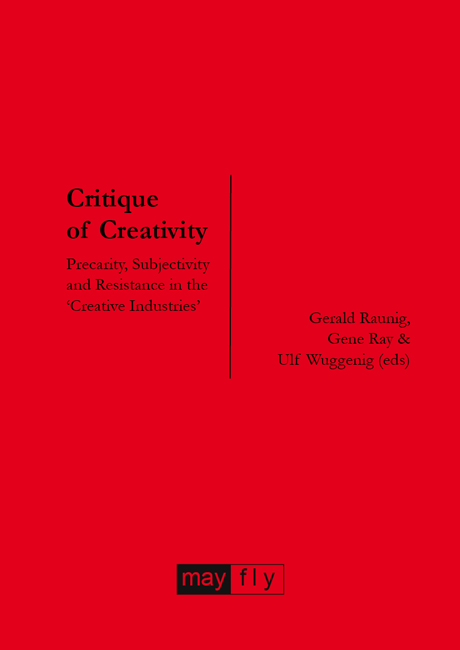Vito Campanelli: Web Aesthetics: How Digital Media Affect Culture and Society (2010)
Filed under book | Tags: · aesthetics, computing, digital media, internet, media, media culture, memes, networks, new media, remix, spam, subjectivity, technology, theory, virus, web

“We live in a world of rapidly evolving digital networks, but within the domain of media theory, which studies the influence of these cultural forms, the implications of aesthetical philosophy have been sorely neglected. Vito Campanelli explores network forms through the prism of aesthetics and thus presents an open invitation to transcend the inherent limitations of the current debate about digital culture.
The web is the medium that stands between the new media and society and, more than any other, is stimulating the worldwide dissemination of ideas and behaviour, framing aesthetic forms and moulding contemporary culture and society.
Campanelli observes a few important phenomena of today, such as social networks, peer-to-peer networks and ‘remix culture’, and reduces them to their historical premises, thus laying the foundations for an organic aesthetic theory of digital media.”
Publisher NAi Publishers, Rotterdam; in association with the Institute of Network Cultures at the Hogeschool van Amsterdam, University of Applied Sciences, October 2010
Studies in Network Cultures series
ISBN 9056627708, 9789056627706
276 pages
Reviews: Greg J Smith (Rhizome, 2011), Alessandro Ludovico (Neural, 2011), Regine Debatty (We Make Money Not Art, 2011).
Book website
Interview with the author (Geert Lovink)
Interview with the author (Pasquale Napolitano, Digicult)
PDF, PDF (25 MB, updated on 2019-3-24)
Comments (7)Félix Guattari: Chaosmosis: An Ethico-Aesthetic Paradigm (1992–) [PT, EN, ES, IT]
Filed under book | Tags: · abstract machine, autopoiesis, cartography, deterritorialization, information theory, machine, mass media, ontology, philosophy, postmodernism, psychoanalysis, psychosis, schizoanalysis, semiotics, structuralism, subjectivity

Guattari’s final book is a succinct summary of his socio-philosophical outlook. It includes critical reflections on Lacanian psychoanalysis, structuralism, information theory, postmodernism, and the thought of Heidegger, Bakhtin, Barthes, and others.
Originally published in French as Chaosmose, Editions Galilee, Paris, 1992.
English edition
Translated by Paul Bains and Julian Pefanis
Publisher Indiana University Press, 1995
ISBN 0253210046, 9780253210043
144 pages
publisher (EN)
google books (EN)
Caosmose (Portuguese, trans. Ana Lúcia de Oliveira and Lúcia Cláudia Leão, 1992, added on 2013-9-26)
Chaosmosis (English, trans. Paul Bains and Julian Pefanis, 1995, updated on 2015-3-26)
Caosmosis (Spanish, trans. Irene Agoff, 1996, added on 2013-1-5)
Caosmosi (Italian, trans. Massimiliano Guareschi, 1996, no OCR, added on 2013-1-5)
Gerald Raunig, Gene Ray, Ulf Wuggenig (eds.): Critique of Creativity: Precarity, Subjectivity and Resistance in the ‘Creative Industries’ (2007–) [DE, EN]
Filed under book | Tags: · creative industries, creativity, critique, precariat, precarity, resistance, subjectivity

“Creativity is astir: reborn, re-conjured, re-branded, resurgent. The old myths of creation and creators – the hallowed labors and privileged agencies of demiurges and prime movers, of Biblical world-makers and self-fashioning artist-geniuses – are back underway, producing effects, circulating appeals. Much as the Catholic Church dresses the old creationism in the new gowns of ‘intelligent design’, the Creative Industries sound the clarion call to the Cultural Entrepreneurs. In the hype of the ‘creative class’ and the high flights of the digital bohemians, the renaissance of ‘the creatives’ is visibly enacted. The essays collected in this book analyze this complex resurgence of creation myths and formulate a contemporary critique of creativity.”
With contributions by: Brigitta Kuster, Maurizio Lazzarato, Esther Leslie, Isabell Lorey, Angela McRobbie, Raimund Minichbauer, Monika Mokre, Stefan Nowotny, Marion von Osten, Gerald Raunig, Gene Ray, Suely Rolnik, Vassilis Tsianos, Paolo Virno, Ulf Wuggenig
Publisher mayfly, London, in conjunction with the European Institute for Progressive Cultural Policies, 2011
Creative Commons Attribution-Noncommercial-No Derivative Works 3.0 Unported License
ISBN 9781906948139
234 pages
Publisher (new ed., DE)
Publisher (EN)
PDF, PDF, EPUB, EPUB (German, 2007/2016, updated on 2020-11-13)
PDF, PDF (English, updated on 2020-11-13)

